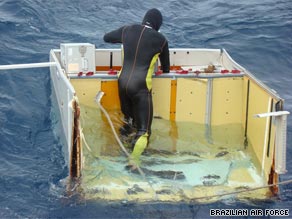
Accident investigators on Tuesday denied that a weak signal had been detected from the missing flight data recorders of the Air France airliner that plunged into the Atlantic earlier this month.
The June 1 crash killed all 228 people on board. France’s Le Monde newspaper reported on its Web site Tuesday that the Nautile mini-submarine set out Monday after French navy vessels detected the ping several hundred kilometers off the coast of Brazil. But the French team investigating the disaster said the “black boxes” from Flight 447 had not been found and that research teams “check out any sound” that might lead to them, Agence France-Presse reported. “No flight recorders have been located to this day,” a spokeswoman for the BEA aviation investigating bureau told AFP. “This is not the first time that we have heard noise. We check out all of these noises. The research effort continues,” she said. The devices will only operate for around another week. Data from the recorders may be crucial in pinning down a cause of the crash.
Don’t Miss
Air France to pay crash victims’ families
Official: Air France bodies had broken bones
Manufacturer optimistic of finding flight data recorder
On Friday Air France said it would pay families about €17,500 ($24,500) in initial compensation for each victim of the crash, the company’s chief executive said. So far, Air France has been in touch with about 1,800 relatives of the people who died when the Airbus A330 crashed, chief executive Pierre-Henri Gourgeon told France’s RTL radio. The aircraft has not been found, though search teams have found dozens of pieces of debris in the water and think they know the general location of the wreck. The head of the French accident investigation board, Paul-Louis Arslanian, said this week that there is a chance the entire aircraft may never be found. Watch more wreckage recovered from crash » With no wreckage and few clues about what caused the plane to go down, searchers remain focused on finding the plane’s data recorders. Autopsies conducted on some of the 50 bodies found so far show they suffered broken bones, including arms, legs and hips, Brazilian authorities have told French investigators, Arslanian said. Experts have said such injuries indicate the flight broke apart before hitting the ocean. Asked about that theory, Gourgeon said he would not go that far. “What I know is that the investigators would like to know the causes of death,” Gourgeon said. “That knowledge of causes of death will better clarify what exactly happened. Were the victims killed before the impact, or during impact” There has been difficulty in exchanging information between French investigators and Brazilian coroners, but that is being resolved, he said.
Investigators are looking at the possible role of airspeed sensors known as Pitot tubes, among other factors, as a possible cause of the crash. The plane sent 24 automated error messages in the four minutes before it crashed, Arslanian said Wednesday. The error messages all indicate there were problems with on-board information about the plane’s speed, which can cause some of the plane’s instruments to stop functioning, Arslanian said.